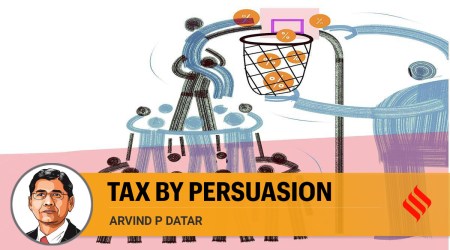[ad_1]
The recent ruling of the Supreme Court on the nature of recommendations made by the GST Council has attracted widespread comments because of the important observations made on Indian federalism, especially on it being a dialogue between cooperative and uncooperative federalism. The states, the court held, were free to use means of persuasion ranging from collaboration to contestation.
In retrospect, the controversy was wholly unnecessary. The Gujarat High Court had quashed the two notifications that levied IGST (Integrated GST) on the ocean freight component in a CIF (cost, insurance and freight) contract. Briefly, the high court held that these notifications were unconstitutional and amounted to double taxation. The Supreme Court, in appeal, had to merely consider the correctness of this judgment. The constitutional status of the GST Council and issues relating to fiscal, collaborative, and cooperative federalism were never raised before the high court. However, before the Supreme Court, the Union of India made far-reaching submissions that led to this landmark ruling on federalism in general, and fiscal federalism in particular.
Article 246A confers simultaneous or concurrent powers on Parliament and the state legislatures to make laws relating to GST. This article is in sharp contrast to the constitutional scheme that prevailed till 2017. It clearly demarcated taxing powers between the Centre and states with no overlaps. After 2017, several central and state levies were subsumed into GST. Each state was to have its own GST Act, all of them being almost identical to the Central GST Act. Inter-state supplies and imported goods are liable to IGST.
Under Article 279A, the GST Council has to make “recommendations” on various topics including the tax rate and exemptions. The Union of India argued that the “constitutional architecture” showed that Articles 246A and 279A, when read together, made the GST Council the ultimate policy-making and decision-making body for framing GST laws. The GST Council was unique and incomparable to any other constitutional body and its recommendations would override the legislative power of Parliament and state legislatures; neither of them could legislate on GST issues independent of the recommendations of the GST Council. The argument went further: On a combined reading of Article 279A, the provisions of the IGST and CGST Acts and the recommendations of the GST Council were transformed into legislation. In simple terms, a recommendation of the GST Council was law and binding on Parliament and state legislatures.
While rejecting these submissions, the three-judge bench made important observations on federalism. Delving into legislative history, the court ruled that a draft Article 279B, which provided for a GST Disputes Settlement Authority, was omitted because it would have effectively overridden the sovereignty of Parliament and the state legislatures, and diminished the fiscal autonomy of the states. Democracy and federalism are interdependent for their survival. If the states had been conferred less power, they could still resist the mandate of the Union by using different forms of political contestation as permitted by constitutional design. Such contestation is valuable as part of “uncooperative federalism”. It was desirable, the Court said, to have some level of friction, some amount of state contestation, some deliberation-generating froth in our democratic system. Therefore, the states could use various forms of contestation if they disagreed with the decision of the Centre. Putting to rest any controversy, the court held that the recommendations of the GST Council had only a persuasive value. To regard them as binding edicts would disrupt fiscal federalism because both the Union and states were conferred equal power to legislate on GST.
The GST Council has the Union finance minister as the chairperson and the Union minister of state in charge of revenue or finance as a member. While these two ministers from the Centre have one-third voting power, 31 states (including two Union Territories) share the remaining two-thirds of the vote. Thus, the GST Council has a total of 33 members. Out of a total of 33 votes, 11 belong to the Centre and 22 votes are shared by 31 states/UT, with each state/UT having a 0.709 vote. Any decision of the GST Council requires a three-fourth majority or a minimum of 25 votes. As the Centre has 11 votes, it requires an additional 14 votes. As each state has a 0.709 vote, at least 20 states must also vote with the Centre in favour of the resolution. Now, each state has one vote regardless of its size. Unlike so many statutes, Article 279A has made no provision to make the decision of the majority binding on the dissenting states. This was deliberate: Paragraph 2.73 of the Select Committee Report on the 122nd Constitution (Amendment) Bill, 2014, noted that this voting pattern was to maintain a fine balance as, in a federal constitution, the dominance of one over the other was to be disallowed. But the Supreme Court rightly noted that several sections in the state GST laws, CGST and in IGST, cast a duty even on dissenting states to issue notifications to implement the recommendations of the GST Council. Thus, the Court held that the state governments and Parliament, while exercising their rule-making powers under the provisions of the State GST Acts, CGST & IGST Acts, are bound by the recommendations of the GST Council. But even this did not mean that all recommendations of the GST Council are binding on state legislatures or Parliament to enact primary pieces of legislation on GST. In effect, states can amend their GST laws if they so choose.
In the end, the attempt of the Union of India to make the GST Council’s recommendations have an overarching and binding effect was unsuccessful. But the Supreme Court’s decision ought to be a wake-up call and deserves careful consideration. The GST Council is founded on the bedrock of collaborative federalism. If the GST Council meets periodically as mandated and there is active participation of the states in making recommendations, no state will oppose a recommendation that has been carefully deliberated and is in the national interest. Indeed, there is little chance of cracks developing in the GST edifice as long as the spirit of cooperative and collaborative federalism prevails.
(The writer is a senior advocate. He appeared for one of the respondents in the concerned case before the Supreme court)
[ad_2]
Source link









